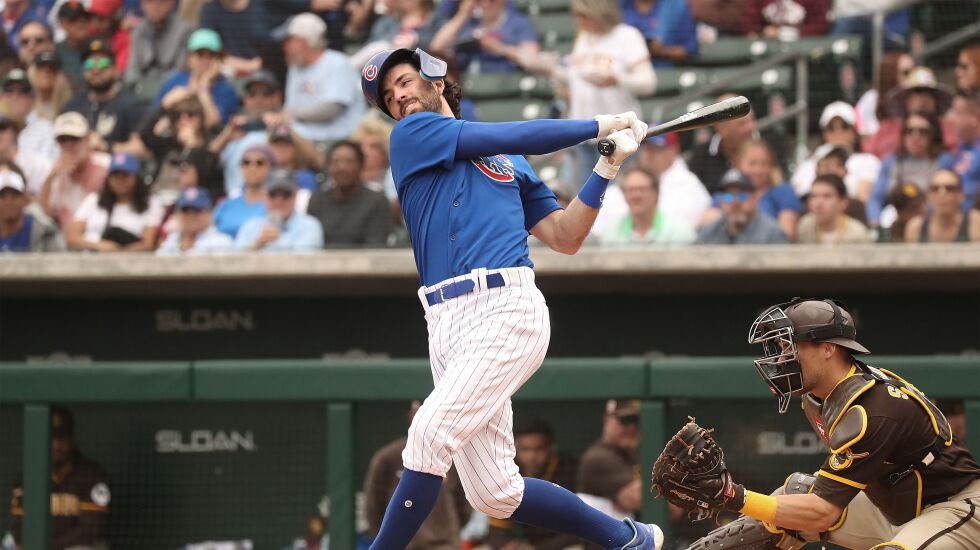
MESA, Ariz. — That one thing that makes a player feel locked in for the regular season varies from person to person.
“When the season was over, I really felt like I was locked in, about the time I thought my skill set was going to shine,” Cubs manager David Ross joked about his playing days. “It’s little things, like the first ball you have to block, or when you’re seeing the baseball, having a good at-bat, working a walk. It’s a confidence thing, it’s a timing thing, it’s seeing the baseball.”
That’s why spring training results can be deceiving. There are countless examples of players who put together a strong spring training slumping in April, or vice versa. Look at Dansby Swanson’s spring performance last year with the Braves. His batting average dipped to .077 with about a week left in camp. He went on to have the best season of his career.
The Cubs aren’t worried about his spring training struggles at the plate now.
“Right now, a lot of it has been, the swing mechanics are really good, he’s in a good spot with how his moves are, and now it just becomes timing,” hitting coach Dustin Kelly told the Sun-Times. “And that’s where a lot of our guys are at right now. And it’s common in spring training for them to really focus on the mechanics, focus on the move that they make, and then as they get 10, 15, 20, at-bats, then it’s like, ‘OK, now my timing’s starting to come back.’”
Hitting 2-for-28 so far, Swanson may be a little behind that mark. But he recorded his first extra-base hit as a Cub on Friday, a double on a fly ball to right field.
“Especially guys that have played for a couple years now, they realize that the spring training numbers don’t matter,” Kelly said. “It’s more about their preparation, and the feels and the moves that they make in the batter’s box. And they couldn’t care less about how many hits they got on a spring training game. It’s more about, ‘OK, did I swing at the right pitch, were my moves in the right spot, and did I barrel the ball up.’”
An hour and a half after the Cubs’ game Sunday, Swanson was still in the batting cages working talking through his swing with Kelly.
When he signed with the Cubs in December, Swanson highlighted cutting down on swing-and-miss in the strike zone as an area he wanted to improve. But he talks about it as an “everyday process and commitment throughout the season”
“There’s times where you don’t feel great,” he told the Sun-times earlier this spring, “there’s times where you feel awesome, this and that and the other. But I think it’s just going to be really beneficial for not only myself, but this team to cut down on that.”
When Swanson references a season-long commitment, he really means the whole season. Last year he played all 162 games on the Braves’ regular season schedule, plus their four playoff games. The year before, when he won the World Series with Atlanta, he played a total of 176 regular and postseason games.
“My one thing when I’m not going well is just a lot of swing-and-miss happens,” Swanson said.
Swanson sees part of minimizing whiffs as physical, taking “crisp” swings. But another part, especially over 162 games, is mental.
“If you’re not ready to hit consistently, then you’re going to end up being late, and a lot of swing-and-miss happens,” Swanson said. “So, you’ve got to marry the two, and good things will happen.”
Swanson can work on those things in spring training, but the regular season will be the real test.
With eight days of camp to go, Ross has seen indications that Swanson could be on the cusp of finding his rhythm.
“When you have a long at-bat and you drive a ball to right field off the wall and feel that, that’s usually a sign that some good things could come after that,” Ross said. “So, not worried about him.”







